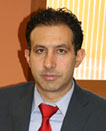Organizers
Conference Chairs
Özlem Ergun
Georgia Institute of Technology
Coca Cola Associate Professor, H. Milton Stewart School of Industrial and Systems Engineering

Dr. Özlem Ergun is an associate professor in the School of Industrial and Systems Engineering. She is also a co-founder and co-director of the Health and Humanitarian Logistics Research Center at the Supply Chain and Logistics Institute. She received a B.S. in Operations Research and Industrial Engineering from Cornell University in 1996 and a Ph.D. in Operations Research from the Massachusetts Institute of Technology in 2001. Professor Ergun’s research focuses on the design and management of large-scale networks. Specifically, she studies logistics and communications networks that are dynamic and partially decentralized. She has recently focused on understanding how collaboration among different entities can help the entities to be more efficient as well as create value for the overall system. She has applied her work on network design, management and collaboration to problems arising in the airline, ocean cargo and trucking industries.
Recently, Dr. Ergun has taken a leadership role in promoting the use of systems thinking and mathematical modeling in applications with societal. As the co-director of Center for Health and Humanitarian Logistics at Georgia Tech, she has worked with organizations that respond to humanitarian crisis around the world, including: World Food Programme, CARE USA, FEMA, USACE, CDC, AFCEMA, and MedShare International.
Professor Ergun teaches undergraduate and graduate courses in optimization and logistics. She was awarded the NSF Career Award in 2003. She won the EURO/INFORMS 2007 Management Science Strategic Innovation Prize given on the subject of Logistics in 2007.
Jarrod Goentzel
MIT Humanitarian Response Lab
Founder and Director

Jarrod Goentzel is founder and director of the MIT Humanitarian Response Lab, which strives to make supply chains more responsive to human needs. His research focuses on supply chain design and management, transportation procurement and planning, humanitarian needs assessments, information management and the use of technology to facilitate decision-making. Based in the MIT Center for Transportation and Logistics, Dr. Goentzel has developed graduate-level courses in supply chain finance, international operations and humanitarian logistics. Previously, Dr. Goentzel was Executive Director of the MIT Supply Chain Management program, a nine-month professional master’s degree program. He joined MIT in 2003 to establish the MIT-Zaragoza International Logistics Program with the Zaragoza Logistics Center in Spain.
Pinar Keskinocak
Georgia Institute of Technology
William W. George Chair, H. Milton Stewart School of Industrial and Systems Engineering; Associate Director of Research for the Health Systems Institute; and co-director of the Health & Humanitarian Logistics Center

Pinar Keskinocak is the Joseph C. Mello Professor in the School of Industrial and Systems Engineering and the co-founder and co-director of the Center for Humanitarian Logistics at Georgia Institute of Technology. She also serves as the Associate Director for Research at the Health Systems Institute at Georgia Tech.
Her research focuses on applications of operations research and management science with societal impact (particularly health and humanitarian applications), supply chain management, pricing and revenue management, and logistics/transportation. She has worked on projects in several industries including automotive, semiconductor, paper manufacturing, printing, healthcare, hotels, and airlines. Her research has been published in journals such as Operations Research, Management Science, Manufacturing & Service Operations Management, Production and Operations Management, IIE Transactions, Naval Research Logistics, and Interfaces.
Miguel Martinez
Trade & Logistics Innovation Center of Mexico - Tecnológico de Monterrey
Executive Director

Miguel Martinez serves as the executive director of the Trade & Logistics Innovation Center in Mexico where he is in charge of developing the competitive agenda for the country. The center was established to improve the logistics performance of Mexico, through the support of applied research in areas such as Humanitarian and Health Logistics, Infraestructure Planning, Food Logistics & Benchmarking. Current projects include Port Connectivity & Competitiveness, Transportation and Warehousing Industry benchmarking, and support to the design of the National Food Logistics Strategy.
Martinez is also founder and President of Neogistics and a thought leader and recognized as a visionary in the logistics space. His expertise in Supply Chain Management, Strategic Network Design and Distribution Planning for food and beverage, consumer packaged goods and 3Pl companies in USA, Asia Pacific, and Latin America has earned him an enviable reputation. In addition, Martinez has been responsible for developing infrastructure plans for Coca Cola Bottlers in Eastern Europe, Japan and througout Latin America. His on-going projects include projects for: Coca-Cola Latin Division, ARCAContal, WWL.
Martinez is currently acting as the academic coordinator for the "Supply Chain Excellence Manager Program" for The Coca-Cola Company in Mexico, Spain and the US.
Martinez holds a Bachelor of Science degree in Industrial and Systems Engineering from the Georgia Institute of Technology. While attending Georgia Tech he was a scholarship tennis player.
Eric Porras
Trade & Logistics Innovation Center of Mexico - Tecnológico de Monterrey
Research Director

Eric Porras received his PhD in Operations from Erasmus University Rotterdam, The Netherlands, and a Master Degree in Economics from the same university. He earned his Bachelor degree in Mechanical Engineering from the National University of Mexico (UNAM). Currently he is the Research Director for the Trade and Logistics Innovation Center, a joint initiative between Tecnologico de Monterrey and Georgia Institute of Technology. This responsibility involves leading projects with the industry and the government in the areas of supply chain management and logistics. He also teaches undergrad courses in Industrial Engineering since 2005, and graduate courses in EGADE Business School since 2007. He has published in various international leading operations journals like the European Journal of Operations Research and the International Journal of Production Economics.
Julie Swann
Georgia Institute of Technology
Harold R. and Mary Anne Nash Associate Professor, H. Milton Stewart School of Industrial and Systems Engineering

Julie Swann is an associate professor in the School of ISyE at Georgia Tech. She received her B.S. in Industrial Engineering from the Georgia Institute of Technology in 1996 and her M.S. and Ph.D. in Industrial Engineering and Management Sciences from Northwestern in 1998 and 2001, respectively. In addition to her university experience, Dr. Swann participated in several research projects at General Motors and IBM, focusing on pricing in different industries. At General Motors, Dr. Swann developed a tool integrating pricing, production and distribution of vehicles while meeting Corporate Average Fuel Economy (CAFE) requirements. At IBM, she explored pricing models for efficient bandwidth allocation.
Dr. Swann is currently focused on the modeling and analysis of problems and algorithms in logistics, transportation and supply chain management. She has particular interests in developing and analyzing tools to manage demand, such as pricing, revenue management, or lead-time quotation, to increase the flexibility in the system and is currently doing work in humanitarian supply chains. Other research interests include applications of economics and optimization to healthcare policy.
Luk Van Wassenhove
INSEAD Humanitarian Research Group
Academic Director

Professor Van Wassenhove’s recent research focus is on closed-loop supply chains (product take-back and end-of-life issues) and on disaster management (humanitarian logistics). He is senior editor for Manufacturing and Service Operations Management and departmental editor for Production and Operations Management. He publishes regularly in Management Science, Production and Operations Management, and many other academic as well as management journals (like Harvard Business Review, and California Management Review). He is the author of many award-winning teaching cases and regularly consults for major international corporations.
In 2005, Professor Van Wassenhove was elected Fellow of the Production and Operations Management Society (POMS). In 2006, he was the recipient of the EURO Gold Medal for outstanding academic achievement. In 2009 he was elected Distinguished Fellow of the Manufacturing and Services Operations Management Society (MSOM). In 2013 he became Honorary Fellow of the European Operations Management Association (EUROMA). He is a member of the Royal Flemish Academy of Sciences. At INSEAD he holds the Henry Ford Chair of Manufacturing. He created the INSEAD Social Innovation Centre and acted as academic director until September 2010. He currently leads INSEAD’s Humanitarian Research Group.
Program Committee
Aruna Apte
Naval Postgraduate School
Associate Professor, Operations and Logistics Management

Aruna received her Ph.D. in Operations Research from Southern Methodist University in Dallas. She also has an M. A. in Mathematics, from Temple University, Philadelphia. Before NPS, she taught at the Cox School of Business, SMU, where she won the best teacher award. She has over twenty years of experience teaching operations management, operations research, and mathematics courses at the undergraduate and graduate levels. At NPS She teaches mathematical modeling, for which she won the best teacher award and has advised over 60 students for MBA/Masters reports.
Her research interests can be categorized in three broad areas in the field of operations and logistics management: Humanitarian Logistics, Service Operations, and Military Logistics. First, humanitarian operations can be viewed as service operations since they provide essential and emergency services. Second, logistics is a critical aspect of humanitarian assistance and disaster response (HA/DR) operations, and many HA/DR operations involve the military acting in conjunction with local government and non-governmental organizations. Thus, these two areas of interest overlap with her principle area of interest, humanitarian logistics.
She has worked as a consultant at MCI. She has advised emergency planners in preparing for disaster response. She is the founding and current president for a new college (focus group) in Humanitarian Operations and Crisis Management under the flagship of Production and Operations Management Society.
Martijn Blansjaar
Oxfam Great Britain
Head of Logistics and Supply, International Division

Martijn Blansjaar started in humanitarian assistance with Medecins Sans Frontieres-Holland as all-round technician/logistician in their Uganda program in 1987. From there on he spent a good five years in the field, predominantly in East Africa in logistics, various technical and project co-ordination positions. In 1994 he joined MSF-Holland HQ at Logistics Department for special assignments on pharmaceutical distribution programs, major emergencies and a review of food aid programs. In 1997 Martijn became Coordinator for Technical Support and from March 2001 Director of Logistics in MSF-Holland. In November 2006, he joined the International Division of Oxfam GB as Head of Logistics and Supply in their headquarters in Oxford. He is a Board member of the HELIOS Foundation for supply chain, on the Executive Committee of the Humanitarian Logistics Association and sits on the Advisory Committee that works with Fritz Institute and the Chartered Institute of Logistics & Transport to develop and maintain a professional Certification for Humanitarian Logistics. Martijn has collaborated in research, curriculum development and as guest lecturer with various Universities including MIT (Zaragoza), Cranfield, USI Lugano, INSEAD and Hanken.
Bernard Chomilier
World Food Programme (WFP)
Head of Logistics Development Unit

Bernard Chomilier has led humanitarian response operations around the world for 30 years, working with organizations such as MSF, IFRC, and WFP. He began in 1984 as the head of Missions for MSF and continued in this role until 1992 in Mozambique, Afghanistan, Pakistan, Malawi and Liberia.From 1992-95 he served as the Director of Logistics for MSF France. He then moved to IFRC where he served as the head of Regional Logistics in Nairobi (in charge of the Great Lakes and Somalia operations) from 1995-98, becoming the Director of Logistics for the IFRC from 1998-2004. He is currently the Head of the Logistics Development Unit at WFP headquarters in Rome, Italy, in charge of staff development and supply chain development, where he has been since 2006.
Carmit Keddem
John Snow, Inc. (JSI)
Deputy Director, Health Logistics

Carmit has more than 10 years of professional experience in international development and public health, working with a wide range of UN, Global Fund, US Government, nationally and privately funded programs. She specializes in the design and implementation of logistics systems for a wide range of health products. Carmit is responsible for planning, managing, and providing direct in-country supply chain technical assistance to improve the management and availability of health products for national programs. She has led and managed high-level technical assistance activities throughout Africa, Asia, and Latin America, including the evaluation, design, and implementation of logistics systems, quantification, strategic planning, and training activities. Carmit holds a M.A. in International Development and Health Policy from the Fletcher School of Law and Diplomacy at Tufts University.
Jemilah Mahmood, M.D.
Doctors of the World USA

Dr. Jemilah Mahmood has extensive humanitarian field experience and has held numerous positions overseeing the coordination and quality of humanitarian relief efforts. In 1999, she founded the Malaysian Medical Relief Society – also know as MERCY Malaysia – one of a handful of international NGOs based in the global South. Dr. Mahmood was also a founding member of the Asian Disaster Reduction & Response Network (ADRRN) and held the position of Chairperson from 2004 to 2009 and Advisor to date. This growing network currently has 41 national NGOs as members and aims to improve standards of disaster response through capacity building, knowledge sharing and networking.
Dr. Mahmood has served on the boards of Save the Children, the Humanitarian Accountability Partnership International (HAPI), and acted as Vice Chair of the International Council of Voluntary Agencies (ICVA). Dr. Mahmood was appointed by the Secretary General to the First Advisory Group of the Central Emergency Response Fund (CERF).and is an active member of the United Nations Disaster Assessment & Coordination Team (UNDAC).
Paul Molinaro
UNICEF
Chief, Supply & Logistics, UNICEF Regional Office, Middle East and North Africa (MENA)

Since August 2013, Paul has been responsible for oversight of UNICEF supply chain activities throughout the MENA region, as well as direct operations to support the response to the Syria crisis. He holds an MSc in Defence Logistics Management from Cranfield University and has over 20 years experience with emergency logistics operations in a number of different countries and with different agencies. Paul has been with UNICEF since the end of 2001, first as Logistics Coordinator for Afghanistan then, from 2004-13, as Emergency Logistics Manager, then as Senior Supply Manager for Change & Development in UNICEF Supply Division, the Supply HQ of UNICEF based in Copenhagen, Denmark.
Prashant Yadav
William Davidson Institute (WDI) and Ross School of Business and the School of Public Health, University of Michigan
Director of HealthCare Delivery Research

Prashant Yadav is Director of HealthCare Delivery Research at the University of Michigan’s William Davidson Institute and a faculty at the Ross School of Business and the School of Public Health at the University of Michigan. A leading expert on pharmaceutical and healthcare supply chains in developing countries, Dr. Yadav’s research explores the functioning of health care supply chains using a combination of empirical, analytical and qualitative approaches. Previously, Dr. Yadav was Professor of Supply Chain Management at the MIT-Zaragoza International Logistics Program. Yadav serves on the advisory boards of many global health organizations including large multilateral, bilateral and private philanthropic organizations. He advises global leaders, policy makers and developing country governments on healthcare supply chains. He also advises pharmaceutical companies on their supply chain strategies in the new emerging markets.
He is the author of many peer-reviewed scientific publications and his work has also been featured in prominent print and broadcast media including The Economist, The Financial Times, Nature and BBC.
Dr. Yadav received his Ph.D. from the Manderson Graduate School of Business at the University of Alabama. He received his MBA from the FORE School of Management and his Bachelor of Chemical Engineering from the Indian Institute of Technology.


